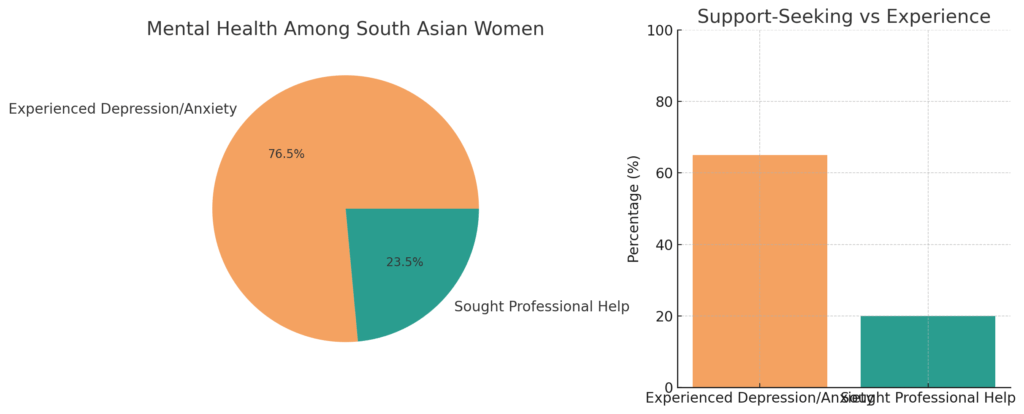
💬 “You don’t look depressed.”
A phrase that countless South Asian women have heard — and internalized. In a culture that prides itself on strength, sacrifice, and the appearance of perfection, the pain beneath the surface often goes unseen, unheard, and unspoken.
🎭 The Mask of the “Good Daughter”
From a young age, South Asian women are taught to suppress discomfort and prioritize others. We are raised to be obedient daughters, loyal wives, and nurturing mothers — roles that rarely leave room for emotional vulnerability.
We smile through breakdowns. We host gatherings while battling anxiety. We perform perfection, even when we’re unraveling inside. Depression doesn’t “look” a certain way — especially when it’s tucked neatly behind a dupatta.
📊 According to MannMukti’s 2023 Mental Health Survey, over 65% of South Asian women reported experiencing symptoms of depression or anxiety, but less than 20% sought professional help.
🧠 Hidden Struggles in Broad Daylight

Here are the two graphics based on the stats:
- A pie chart showing the proportion of South Asian women who experience depression or anxiety versus those who seek help.
- A bar chart comparing those same figures side by side.
For women of color, especially within South Asian communities, depression often hides behind:
- Academic success
- Marital duties
- Religious obligations
- Cultural silence
When we try to speak up, we hear:
“It’s just a phase.”
“Pray about it.”
“Don’t bring shame to the family.”
This emotional censorship isn’t just invalidating — it’s harmful.
🧕🏽 Real Voices

Nilofer, 27, shared:
“I would go to work and come home and cry until I fell asleep. My parents thought I was just tired. I was dying inside, but I couldn’t even say the word ‘depression’ without being told I was overreacting.”
Priya, 22, said:
“I tried to explain to my nani that I felt heavy all the time. She said, ‘You think too much.’ So I stopped talking.”
✨ Healing in Hushed Tones
More South Asian women are finally beginning to break the silence. Through platforms like Brown Girl Therapy and MannMukti, mental health conversations are emerging — slowly but powerfully.
Social media pages, community circles, and culturally competent therapists are helping women reclaim their emotions without shame.
💡 What We Need:
- Safe, stigma-free spaces to speak
- Representation in therapy
- Education for older generations
- Culturally relevant mental health resources
- Validation — not dismissal — of our struggles
❤️ A Note to You
If you’re a South Asian woman silently carrying the weight of depression — know this:
You’re not alone.
You’re not weak.
And your pain deserves space, compassion, and healing.
Take off the mask.
Even behind the dupatta, your story matters.
No Responses